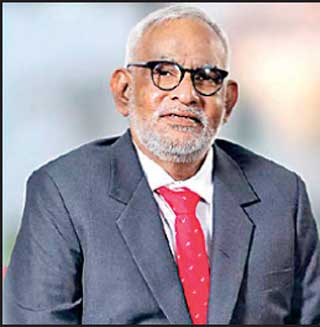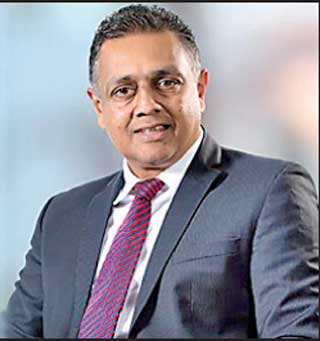Tuesday Feb 17, 2026
Tuesday Feb 17, 2026
Thursday, 22 February 2024 00:28 - - {{hitsCtrl.values.hits}}
 |
| Chairman J.Durairatna |
 |
| CEO Thimal Perera |
In a demanding banking landscape, DFCC Bank said yesterday it demonstrated resilience amidst significant local economic disruptions.
DFCC Bank PLC, the largest entity within the Group, reported a Profit Before Tax (PBT) of Rs. 10,960 million and a Profit After Tax (PAT) of Rs. 7,220 million for the year ended 31 December 2023 compared with the previous year’s PBT of Rs. 2,439 million and a PAT of Rs. 2,513 million. The Group recorded a PBT of Rs. 12,508 million and PAT of Rs. 8,659 million for the year ended 31 December 2023 as compared to Rs. 3,112 million and Rs. 3,042 million, respectively, in 2022. All the member entities of the Group made positive contributions to this performance. The Bank’s Return on Equity (ROE) improved to 12.19% during the year ended 31 December 2023 from 5.04% recorded for the year ended 31 December 2022.
The Bank’s Return on Assets (ROA) before tax for the year ended 31 December 2023 is 1.82% compared to 0.46% for the year ended 31 December 2022. The Bank’s total tax expense, which includes Value Added Tax (VAT) and Social Security Contribution Levy (SSCL) on financial services and Income Tax is Rs. 6,927 million for the year ended 31 December 2023. As a result, the Bank’s tax expense as a percentage of operating profit for the year stood at 48.96%.
DFCC also declared a final dividend of Rs. 5 per share, consisting of Rs. 3 per share in cash and Rs. 2 per share in the form of a scrip dividend for 2023.
DFCC said proactive policy adjustments facilitated a notable reduction in historically high-interest rates aimed at bolstering economic growth and stabilising inflation. These adjustments, initiated in June 2023, envisaged a substantial and widespread decrease in lending rates across markets, aligning with the overarching goal of monetary easing. Complementing this effort, DFCC Bank promptly aligned with directives, reducing lending and deposit rates to ensure the effective transmission of monetary policy benefits to businesses and individuals. Moreover, the Bank strategically augmented profitability by optimising its investment portfolio, notably through increased holdings in high-yield government securities. These measures enabled the Bank to maintain profitability whilst providing much needed concessions to our valued customers during these challenging times.
The following commentary relates to the unaudited Financial Statements for the period ended 31 December 2023, presented in accordance with Sri Lanka Accounting Standard 34 (LKAS 34) on “Interim Financial Statements”.
Net Interest Income
The tight liquidity conditions in the domestic money market have resulted in continuously rising market interest rates in early 2023. While the higher interest rates have depressed the lending portfolio, strategically, the Bank increased its investment portfolio in high yield government securities, which led to an overall improvement in Net Interest income (NII). However, with the market guidance provided by the Central Bank, along with improvement in liquidity conditions of the domestic money market in line with the relaxed monetary policy stance of the Central Bank, both deposit and lending interest rates have continued to adjust downwards. Accordingly, the Bank has reduced both lending and deposit rates to align with the monetary directions to ease monetary conditions for individuals and businesses adequately and swiftly, thereby supporting the envisaged rebound of the economy. While lower interest rates may have resulted in reduced interest income and expenses, in nominal terms, Net Interest Income (NII) has continued to improve as a metric during the period under review as a result of the Bank’s strategy of investing in high-yield Government securities.
Strategically, the Bank thus increased its fixed-income investment portfolio, contributing significantly to increased interest income and The Bank’s Net Interest Income (NII), which is its core business, increased by 18% to reach Rs. 31 billion by the end of 2023. The interest margin increased from 4.96% in December 2022 to 5.18% by December 2023.
Fee and Commission Income
The Bank’s dynamic strategies and the efforts of its dedicated teams led to increased remittances, trade-related commissions, and other fee income lines, which contributed to the increase in non-funded business during the period. Fee income generated by credit cards also increased significantly, in line with the volume of the transactions. Accordingly, net fee and commission income have increased by 36% to Rs. 3,905 million for the year ended 31 December 2023, compared to Rs. 2,877 million for the comparative period in 2022.
Impairment Charge on Loans and Other Losses
The impaired loan (stage 3) ratio increased from 4.36% in December 2022 to 7.03% as of 31 December 2023, continuing the prevalent trend amidst the present economic conditions. However, the positive developments in the macroeconomic environment coupled with the Bank’s concerted efforts in recoveries resulted in reducing the impairment charge for the year 2023 compared to the year 2022. To address the current and potential future impacts of the present economic conditions on the lending portfolio, the Bank made adequate impairment provisions during the year by continuing to calibrate internal models to account for unseen risk factors in the future, including additional provisions made for the Bank’s exposure to risk elevated sectors.
The Bank has used significant judgment using the information available at the reporting date to estimate the recoverable value of foreign currency-denominated investment securities issued by the Government of Sri Lanka. Accordingly, an impairment charge has been recognised to maintain a provision cover of 50% on the above investments.
Accordingly, with these provisions to address the additional risks in the economic environment, the impairment charge recorded at Rs. 13,985 million for the year ended 31 December 2023, compared to Rs. 17,041 million in the comparable period.
Operating Expenses
Operating expenses for the year ended 31 December 2023 increased to Rs. 11,720 million compared with Rs. 10,117 million during the corresponding period in 2022, primarily due to the increase in inflation. However, the Bank has taken numerous cost control measures within the Bank, resulting in operating expenses being curtailed and managed at these levels. The Bank achieved a healthy 29.41% cost/income ratio in 2023 compared to 32.79% in 2022.
Other Comprehensive Income (OCI)
Changes in the fair value of investments in equity securities and fixed-income securities (treasury bills and bonds) and movement in hedging reserves are recorded through other comprehensive income. Due to the application of hedge accounting, the impact on the total equity of the Bank due to exchange rate fluctuation was minimised. A fair value gain of Rs. 7,016 million was recorded on account of equity securities outstanding as at 31 December 2023. The increase in the share price of Commercial Bank of Ceylon PLC during the period was the main contributor to the reported fair value gain in equity securities. The favourable movement in treasury bills and bond yields also resulted in a fair value gain of Rs. 5,932 million during the year.
Business Growth
Assets
Despite the challenges faced by the economy and the banking sector, DFCC Bank’s total assets increased by Rs. 74.6 billion, recording a growth of 13% from December 2022. Aligning the Bank’s growth strategy to the present economic climate by increasing investment in fixed-income securities, combined with positive fair value movement in both fixed-income securities and equity securities, has contributed to a 113% increase in investment in financial assets at fair value through other comprehensive income as of 31 December 2023 compared to the balance as of 31 December 2022. With increased provision for expected credit losses, appreciation of the Sri Lanka Rupee compared to 31 December 2022 and considerable economic challenges, the net loan portfolio has recorded Rs. 349 billion as at 31 December 2023, which is 6% lower than the balance as at 31 December 2022.
Liabilities
The Bank’s deposit base experienced a growth of 9.97% during the year, recording an increase of Rs. 37 billion to Rs. 407 billion, up from Rs. 370 billion as at 31 December 2022. This resulted in recording an improved loan-to-deposit ratio of 96.92%. Further, the CASA ratio was 23.79% as at 31 December 2023. The Bank’s funding costs were also contained using medium to long-term concessionary credit lines, primarily used to grow the lending portfolio and provide much needed concessionary funding to our customers. Considering these concessionary term borrowings, the CASA ratio further improved to 33.57%, and the loans-to-deposit ratio improved to 84.47% as at 31 December 2023.
Equity and Compliance with Capital Requirements
DFCC Bank’s total equity increased to Rs. 68 billion as at 31 December 2023, supported by favourable movements in the equity portfolio and fixed income security portfolio classified as fair value through other comprehensive income, and positive movements in the hedging reserve, together with the recorded profit after tax of Rs. 7.2 billion. Accordingly, Tier 1 and Total Capital ratios improved to 11.49% and 13.51%, by 31 December 2023, compared to 10.09% and 13.15%, respectively, as at 31 December 2022. The Bank’s Net Stable Funding Ratio (NSFR) was 124.60%, and Liquidity Coverage Ratio (LCR), all currency, was 597.47% as at 31 December 2023, compared to 126.55% and 202.34%, respectively, as at 31 December 2022. All these ratios were thus maintained well above the minimum regulatory requirement.
DFCC Bank CEO Thimal Perera said: “In light of our robust financial performance in 2023, marked by substantial growth in total assets, deposit base, and profitability metrics, including a notable 187% increase in profit after tax, DFCC Bank remains steadfast in its commitment to prudent financial management and sustainable growth. Our strategic investments in high-yield government securities and focused efforts on fee income generation have bolstered our net interest income and non-funded business lines. Despite prevailing economic challenges, we have maintained resilient credit quality and fortified our capital position, as evidenced by improved equity ratios and compliance with regulatory requirements. Our dedication to innovation and customer-centric values continues to be recognised, reaffirming DFCC Bank’s position as a leader in the banking sector. Looking ahead, we remain focused on driving inclusive growth, fostering sustainability, and delivering value to all stakeholders.”
“A significant milestone this year was our accreditation by the Green Climate Fund (GCF), making DFCC Bank the first entity in Sri Lanka to receive such recognition. We are also honoured to receive prestigious accolades such as the ‘Euromoney Cash Management- Market Leader Award 2023’ and the Merit Award for the ‘Green Brand of the Year’ at SLIM Brand Excellence. These recognitions underscore our unwavering dedication to sustainability, innovation, and customer-centric values. As we continue to revamp our Corporate and Retail banking digital platforms and implement concessionary lending schemes to support our customers during challenging times, we remain committed to serving as the Bank for Everyone, supporting sustainable and social entrepreneurship and driving positive change in the communities we operate and serve,” Perera added.